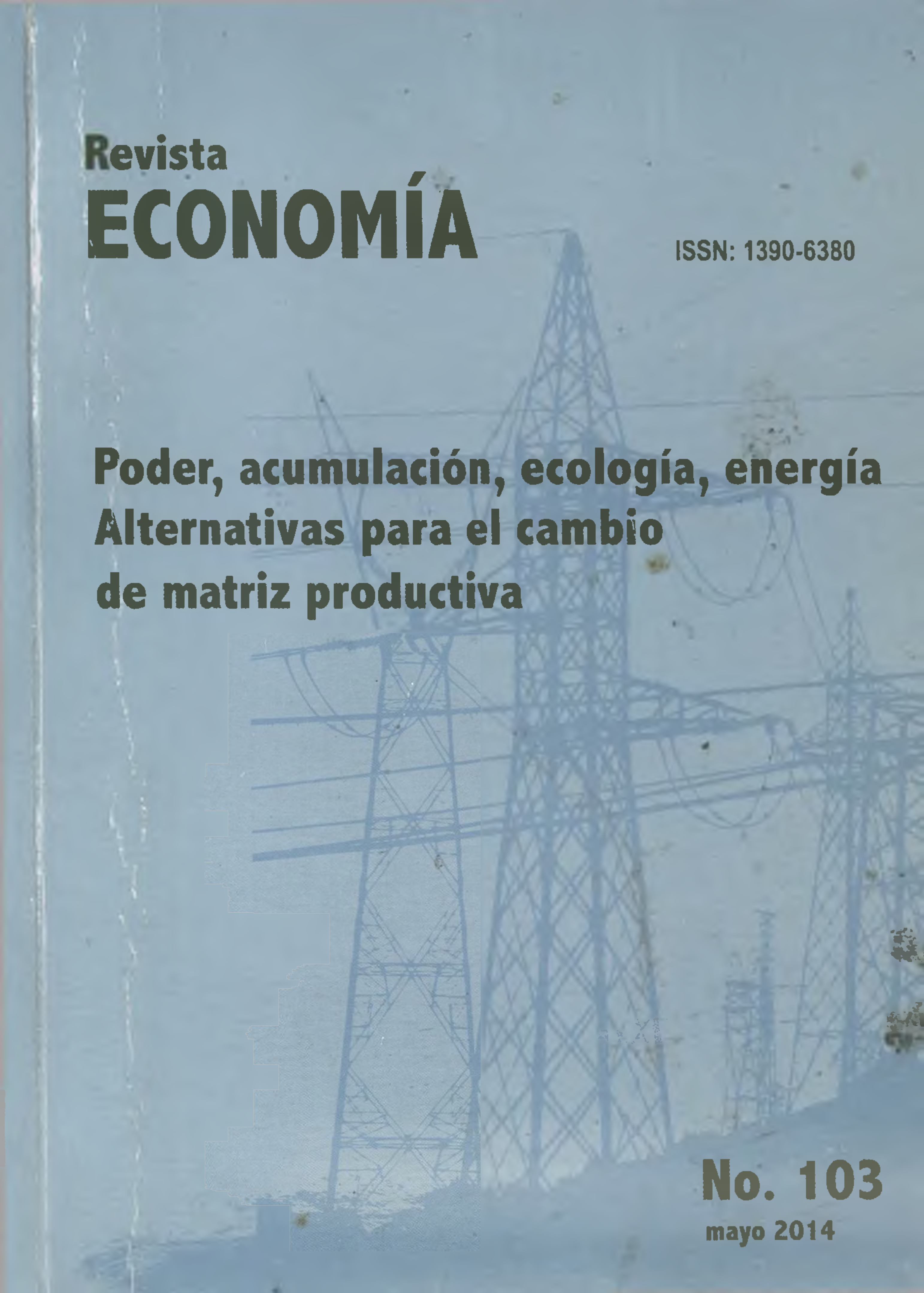Matriz productiva, maldición de los recursos y vías de transición: una lectura desde la Crítica de la Economía Política
Main Article Content
Abstract
This article opposes the categories of productive matrix and capital reproducticn pattem, holding that the latter one offers a more complex view of reality and helps to empirically identify the key nodes of the economic transformation required by the country. Atheoretical argumentation is made about the so-called curse of resources from the viewpoint of the critique of política! economy, as opposed to the institutionalist trends. Finally, a reflection is made about the transition and the importance of a new power balance that favors a profound and sustained change of the capital reproduction pattem and the State
Downloads
Article Details

This work is licensed under a Creative Commons Attribution-NonCommercial 4.0 International License.
The authors who publish in this journal accept the following conditions:
- The authors retain the copyright and assign to the Economics Magazine the right of the first publication, with the work registered under Creative Commons Attribution-NonCommercial 4.0, which enables third parties to redistribute, commercial or non-commercial, of what has been published as long as the article circulates completely and without changes.
- Authors can make other independent and additional contractual agreements for the distribution of the article published in this journal (for example, add it to an institutional repository or publish it in a book) as long as they clearly and clearly specify that the article was published for the first time. once in Revista Economía. In case of reproduction, a note similar to the one presented below must be included: This text was originally published in the Revista Economía No.…, volume…, number of pages, year of publication.
- Authors are suggested to publish their work on the internet (for example, on institutional or personal pages) of the final version published by Revista Economía since this can lead to greater and faster dissemination of the published article.
References
Acosta, A. (1995). Breve historia económica del Ecuador. (C. E. Nacional, Ed.) Quito, Ecuador: Corporación Editora Nacional.
Arellano-Yanguas, J. (2013). Minería y conflicto en Perú: sembrar minerales cosechar una avalancha de piedras. In A. E. Bebbington, & A. Bebbington (Ed.), Industrias extractivas. Conflicto social y dinámicas institucionales en la Región Andina. Lima: IEP, CEPES, GPC.
BCE. (06 de 05 de 2009). Regulación 184-2009.. Quito.
Bebbington, A. (2013 a). Industrias extractivas, conflictos socioambientales y transforaciones político-económicas en América andina. In B. Anthony, Industrias extractivas. Conflicto social y dinámicas institucionales en la Región Andina. Lima: IEP, CEPES, GPC.
Bebbington, A. (2013 b). Conflicto social e instituciones emergentes: hipótesis desde Piura, Perú. In A. E. Bebbington, & A. Bebbington (Ed.), Industrias extractivas. Conflicto social y dinámicas institucionales en la Región Andina. Lima: IEP, CEPES, GPC.
Bebbington, A. (2013). Industrias extractivas, conflictos socioambientales y transforaciones político-económicas en América andina. In B. Anthony, Industrias extractivas. Conflicto social y dinámicas institucionales en la Región Andina. Lima: IEP, CEPES, GPC.
Camón, D., & Sánchez, R. (2013). Pensar las alternativas. Economía extractiva y efectos comparados: turismo, petróleo y minería. Quito, Ecuador: Fundación Rosa Luxemburg.
CEEF-UEES. (2013). Informe CEEF 4. Universidad Espíritu Santo, Centro de Estudios Económicos y Financieros. Guayaquil: Universidad Espíritu Santo.
ECUARRUNARI. (21 de 03 de 2012). ecuarrinari.org. From Ecuador, la mina de China: http: //ecuaru nari.org/portal/noticias/Ecuador-la-mina-de-China
El Telégrafo. (18 de Marzo de 2013). ¿Qué implica un cambio en la matriz productiva? Más que menos (suplemento de Diario El Telégrafo). Guayaquil, Ecuador.
Gudynas, E. (2011). Caminos para las transiciones post extractivas. In A. Alayza, & E. Gudynas, Transiciones. Post extractivismo y alternativas a la extracción en el Perú. Lima, Perú: RedGe y CEPES.
Katz, C. (2004). Comunismo, socialismo, transición. Metas y fundamentos. La Habana, Cuba: Editorial de Ciencias Sociales.
Larrea, C. (2006). Hacia una historia ecológica del Ecuador. Propuesta para el debate. Quito: Coorporación Editora Nacional, Universidad Andina Simón Bolívar, Eco Ciencia.
Marini, R. M. (1991). Dialéctica de la dependencia. (E. Era, Ed.) México, México: Ediciones Era.
Martínez, A., & Rosenfeld, A. (2011). Normas de calidad, responsabilidad social y turismo. Hacia un turismo sustentable. Buenos Aires, Argentina: LADEVI EDICIONES.
Meiksins Wood, E. (2000). Democracia contra capitalismo. México, D.F., México: Siglo Veintiuno Editories S.A.
Mészáros, I. (2008). El desafío y la carga del tiempo histórico. El socialismo en el siglo XXI. (C. Vadell Hermanos, Ed.) Caracas, Venezuela: Vadell Hermanos, CLACSO.
Orihuela, J. C., & Thorp, R. (2013). La economía política del manejo de las industrias extractivas en Bolivia, Ecuador y Perú. In A. E. Bebbington, & A. Bebbington (Ed.), Industrias extractivas, conflicto social y dinámicas institucionales en la región andina. Lima, Perú: IEP, CEPES, GPC.
Orosco, M. (2013). Una política sin rumbo: El caso del sector petrolero ecuatoriano 2005-2010. Quito: FLACSO Ecuador.
Osorio, J. (2004). El Estado en el centro de la mundialización. La sociedad civil y el asunto del poder. México: Fondo de Cultura Eocnómica.

